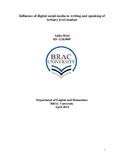| dc.contributor.advisor | Akhter, Mahmuda | |
| dc.contributor.author | Belal, Anika | |
| dc.date.accessioned | 2016-07-12T09:52:18Z | |
| dc.date.available | 2016-07-12T09:52:18Z | |
| dc.date.copyright | 2014 | |
| dc.date.issued | 2014-04 | |
| dc.identifier.other | 12263005 | |
| dc.identifier.uri | http://hdl.handle.net/10361/5557 | |
| dc.description | This thesis is submitted in partial fulfillment of the requirements for the degree of Masters of Arts in English, 2014. | en_US |
| dc.description | Cataloged from PDF version of Thesis. | |
| dc.description | Includes bibliographical references (page 37 - 41). | |
| dc.description.abstract | The creation of digital social media has brought a huge change among the people of 20th
century. This new technology carries much weight as a new medium for students and also for
the educators to build social connections. Anderson (2008) says online learning, as a subset of
all distance education, has always been concerned with provision of access to educational
experience that is, at the least, more flexible in time and in space than campus-based
education (p. 53). The purpose of that study is to find out how the digital social media
influence the writing and speaking, how they motivate students to improve their productive
skills, and in what extend SNS is useful for the students to improve English language. With the aim of exploring the influence of digital social media in writing and speaking of tertiary
level student, this research was conducted at 8 private and public universities in Bangladesh. A
sample of sixteen teachers and one hundred sixty students were respectively selected from five
private universities and three public universities in Bangladesh. Both qualitative and quantitative
methods were applied during data analysis. The results indicated that digital social media has
several influence in the writing and speaking of tertiary level student with the positive effects
outweighing the negative effects. The findings confirmed that students as well as the teachers can
formulate group discussions where they can exchange their ideas, can share course related
materials, appeal to their student about assignments which helping the students to enhance their
writing as well as their speaking. However the findings affirmed that digital social media also has
some negative influence. The students use short form of words, incorrect grammar and sentence
structure in their formal writing and speaking unconsciously, which are the affects of digital
social media as students are now much more familiar with those types of language. So the principal conclusion was that the use of digital social media has both positive and negative
influence, but the student has to motivate themselves properly to utilize the use of SNS which
will enrich their English writing and speaking. | en_US |
| dc.description.statementofresponsibility | Anika Belal | |
| dc.format.extent | 55 pages | |
| dc.language.iso | en_US | en_US |
| dc.publisher | BRAC University | en_US |
| dc.rights | BRAC University thesis are protected by copyright. They may be viewed from this source for any purpose, but reproduction or distribution in any format is prohibited without written permission. | |
| dc.subject | English and humanities | en_US |
| dc.subject | Digital social media | en_US |
| dc.title | Influence of digital social media in writing and speaking of tertiary level student | en_US |
| dc.type | Thesis | en_US |
| dc.contributor.department | Department of English and Humanities, BRAC University | |
| dc.description.degree | M.A. in English | |

